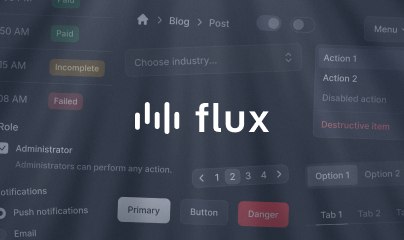Url
The #[Url] attribute stores a property's value in the URL's query string, allowing users to share and bookmark specific states of a page.
Basic usage
Apply the #[Url] attribute to any property that should persist in the URL:
<?php // resources/views/components/user/⚡index.blade.php use Livewire\Attributes\Computed;use Livewire\Attributes\Url;use Livewire\Component;use App\Models\User; new class extends Component { #[Url] public $search = ''; #[Computed] public function users() { return User::search($this->search)->get(); }};?> <div> <input type="text" wire:model.live="search" placeholder="Search users..."> <ul> @foreach ($this->users as $user) <li wire:key="{{ $user->id }}">{{ $user->name }}</li> @endforeach </ul></div>When a user types "bob" into the search field, the URL updates to https://example.com/users?search=bob. If they share this URL or refresh the page, the search value persists.
How it works
The #[Url] attribute does two things:
- Writes to URL - When the property changes, it updates the query string
- Reads from URL - On page load, it initializes the property from the query string
This creates a shareable, bookmarkable state for your component.
URL vs Session
Both #[Url] and #[Session] persist property values, but with different trade-offs:
| Feature | #[Url] |
#[Session] |
|---|---|---|
| Persists across refreshes | ✅ | ✅ |
| Persists when sharing URL | ✅ | ❌ |
| Keeps URL clean | ❌ | ✅ |
| Visible to user | ✅ | ❌ |
| Shareable state | ✅ | ❌ |
Use #[Url] when you want users to be able to share or bookmark the current state. Use #[Session] when state should be private.
Using an alias
Shorten or obfuscate property names in the URL with the as parameter:
<?php // resources/views/components/user/⚡index.blade.php use Livewire\Attributes\Url;use Livewire\Component; new class extends Component { #[Url(as: 'q')] public $search = '';};The URL will show ?q=bob instead of ?search=bob.
Excluding values
By default, Livewire only adds query parameters when values differ from their initial value. Use except to customize this:
<?php // resources/views/components/user/⚡index.blade.php use Livewire\Attributes\Url;use Livewire\Component; new class extends Component { #[Url(except: '')] public $search = ''; public function mount() { $this->search = auth()->user()->username; }};Now Livewire will only exclude search from the URL when it's an empty string, not when it equals the initial username value.
Always show in URL
To always include the parameter in the URL, even when empty, use keep:
#[Url(keep: true)] public $search = '';The URL will always show ?search= even when the value is empty.
Nullable properties
Use nullable type hints to treat empty query parameters as null instead of empty strings:
<?php // resources/views/components/user/⚡index.blade.php use Livewire\Attributes\Url;use Livewire\Component; new class extends Component { #[Url] public ?string $search; };Now ?search= sets $search to null instead of ''.
Browser history
By default, Livewire uses history.replaceState() to modify the URL without adding browser history entries. To add history entries (making the back button restore previous query values), use history:
#[Url(history: true)] public $search = '';Now clicking the browser's back button will restore previous search values instead of navigating to the previous page.
When to use
Use #[Url] when:
- Building search or filter interfaces
- Implementing pagination
- Creating shareable views (map positions, selected filters, etc.)
- Allowing users to bookmark specific states
- Supporting browser back/forward navigation through states
Example: Product filtering
Here's a practical example of filtering products with multiple URL parameters:
<?php // resources/views/pages/⚡products.blade.php use Livewire\Attributes\Computed;use Livewire\Attributes\Url;use Livewire\Component;use App\Models\Product; new class extends Component { #[Url(as: 'q')] public $search = ''; #[Url] public $category = 'all'; #[Url] public $minPrice = 0; #[Url] public $maxPrice = 1000; #[Url] public $sort = 'name'; #[Computed] public function products() { return Product::query() ->when($this->search, fn($q) => $q->search($this->search)) ->when($this->category !== 'all', fn($q) => $q->where('category', $this->category)) ->whereBetween('price', [$this->minPrice, $this->maxPrice]) ->orderBy($this->sort) ->paginate(20); }};?> <div> <input type="text" wire:model.live="search" placeholder="Search products..."> <select wire:model.live="category"> <option value="all">All Categories</option> <option value="electronics">Electronics</option> <option value="clothing">Clothing</option> </select> <input type="range" wire:model.live="minPrice" min="0" max="1000"> <input type="range" wire:model.live="maxPrice" min="0" max="1000"> <select wire:model.live="sort"> <option value="name">Name</option> <option value="price">Price</option> <option value="created_at">Newest</option> </select> @foreach($this->products as $product) <div wire:key="{{ $product->id }}">{{ $product->name }} - ${{ $product->price }}</div> @endforeach</div>Users can share URLs like:
https://example.com/products?q=laptop&category=electronics&minPrice=500&maxPrice=1500&sort=priceSEO considerations
Query parameters are indexed by search engines and included in analytics:
- Good for SEO - Each unique query combination creates a unique URL that can be indexed
- Analytics tracking - Track which filters and searches users are using
- Shareable on social media - Query parameters are preserved when sharing links
Learn more
For more information about URL query parameters, including the queryString() method and trait hooks, see the URL Query Parameters documentation.
Reference
#[Url( ?string $as = null, bool $history = false, bool $keep = false, mixed $except = null, mixed $nullable = null,)]| Parameter | Type | Default | Description |
|---|---|---|---|
$as |
?string |
null |
Custom name for the query parameter in the URL |
$history |
bool |
false |
Push URL changes to browser history (enables back button) |
$keep |
bool |
false |
Keep the query parameter when navigating away |
$except |
mixed |
null |
Value(s) to exclude from the URL |
$nullable |
mixed |
null |
Value to use when query parameter is missing from URL |
